
I write in defence of Her Majesty’s Customs and Revenue!
Intellectually I believe in tax incentives, a low tax economy, flexibility and so on. These, however, are matters of debate and policy upon which individuals may legitimately differ. Once a policy is set it is surely both reasonable and moral that the law is consistently applied.
Enter the case of the BBC presenters.
Christa Ackroyd was a regional BBC presenter contracted through a personal service company. Ms Ackroyd lost a case in the First Tier Tribunal (which hears tax appeals) on her employment status with the BBC. Her Majesty’s Customs and Revenue (HMRC) were seeking to recover tax and national insurance from the company through which Christa Ackroyd was contracted via a mechanism known as IR35 – the essence of the argument being that to all intents and purposes she was an employee of the BBC and should be taxed as an employee rather than an independent contractor.
The full judgement was released on 10th February 2018 and can be read here.
Ackroyd was under contract for 225 days a year to the BBC and the contract, which covered 7 years, could be ended only by ‘material breach.’ She was restricted from working elsewhere without permission and her company could not provide a substitute for Ackroyd. The Tribunal ruled that she was economically dependent on this contract (in fact it seems that between 95% and 100% of her income derived from this contract) and its’ nature was that of a contract of employment. This was in essence stable and continuous employment, not a series of short-term contracts.
The presenters are now up in arms. Firstly, they protest that the BBC forced them to take this stance and contract through personal service companies and secondly, that the BBC is now inserting clauses into contractual arrangements transferring the entire risk for any potential tax liability to the individual. Many, say the presenters, are now working ‘out of contract’ and could therefore be released from their posts with minimal notice.
Both parties are being disingenuous.
First, in principle, HMRC are surely correct. If a presenter was a genuine freelancer, presenting programmes for different companies in different places on a relatively short-term basis then there is a real case for that individual to be considered self-employed whether individually or via a personal service company. However, if that presenter works nearly exclusively for the BBC (both in time and economically), and has, say, presented the same programme for many years, it is difficult to see how that can be reasonably justified.
Second, both parties have benefited from these arrangements. If a contractor operating through a service company agrees a deal with a client then the fees are almost certainly going to be higher than if the person is employed. This is because the main saving in these arrangements is 13.8% employers’ national insurance. Self-employment or contracting deals usually share the benefit; so the BBC pays less than 113.8% of ‘base salary’ and the presenter receives more than 100% of ‘base salary’. Strange that doesn’t get mentioned.
The benefits accruing to the presenter do not stop there. The second real benefit is what can be claimed as expenses payable from pre-tax rather than post-tax income. In particular the presenters – if self-employed contractors – will be able to claim their travel commuting costs (whether from Macclesfield to Salford, or even London to Salford). That is because a genuinely self-employed contractor will be travelling from place to place, from job to job, so it is entirely reasonable for such costs to be tax deductible. However, a commute from home to the same place of work is not tax allowable for the rest of us.
I do not know whether any of the presenters employ spouses, partners or family members to administer their companies, do the accounts, make the tea etc. However, I strongly suspect that some will do exactly that. Hence more income can be paid into the household at standard rather than higher rates of tax. Payment by dividends may also lead to some further savings on national insurance.
Third, by refusing normal employment contracts, and with the presenters resisting, the situation appears to be that the BBC are employing presenters without contracts. There is no difference in substance here from a zero hours contract – the sort that the BBC condemns in its investigative journalism of, for example, Sports Direct. The fact that their presenters have some 000’s on the end of their salaries/fees does not change the principle. The BBC could offer ‘employment contracts’ if it chose to do so and there is a sniff of hypocrisy when they expose others who do not do so and then fail to act properly themselves.
Why does it matter?
For two reasons.
First, the reputation of the market economy. An innovative, enterprise, capitalist economy requires a good deal of freedom of action and organisation. However, if participants in the economy – whether corporate or individual – act immorally the damage is to the whole system of democratic, market-based capitalism. What do I mean by acting immorally in this case? What about holding oneself out as an independent, self-employed contractor (in the case of the presenters) or requiring your presenters to do so (in the case of the BBC) when in reality the arrangement is one of employment as indicated in the judgement.
Second, the importance of incentivising the genuinely self-employed. Small, self-employed businesses are the life-blood of our economy. They provide opportunity, employment, freedom and income. Self-employment is one way in which motivated individuals express their aspirations to be successful and grow businesses. They take risks that others would not and do not and their entitlements to various employment or welfare rights are less than with employees. Hence it is right and responsible that those in that position receive at least some degree of favourable tax treatment. For these arrangements to be either abused or blurred will ultimately be damaging to those whom the system is genuinely designed to assist.
By muddying the waters, the BBC and its well-paid presenters, may be damaging not only our economy and its basis, but the genuinely, hard-working, striving self-employed.
 Dr Richard Turnbull is the Director of the Centre for Enterprise, Markets & Ethics (CEME). For more information about Richard please click here.
Dr Richard Turnbull is the Director of the Centre for Enterprise, Markets & Ethics (CEME). For more information about Richard please click here.
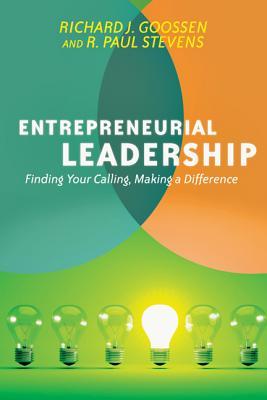
I have to begin by declaring something of an interest. Before becoming a priest in the Church of England I was an entrepreneur and writer of business books. For the majority of the time I ran my brand agency I was a non-Christian. Looking back, I think we managed to be a highly ethical business with no direct input from Christian sources. At one point I hired an ex-priest who came to work for us. I remember him saying that we were far more ethical than any Christian organisation that he had ever worked for. In fact he said that we were the most Christian place he had ever worked.
So you’ll probably realise why I have a few problems with this book by Goossen and Stevens, who at times seem to make a claim for the moral high ground for especially Christian entrepreneurial leaders.
But let’s begin at the beginning. This is certainly an admirable enterprise and it sets out to ask and answer some pertinent questions. Are entrepreneurs born, not made? What difference does a Christian faith make to being an entrepreneur? Where does leadership come from?
The book begins with some interesting section on what entrepreneurialism is – what is its essence. This is clearly an important issue for the church. There is perhaps an inherent dualism whereby church is seen as a place of holiness and work a place of toil and compromise. The authors are keen to help us torpedo this.
The authors are persuasive in their conviction that entrepreneurialism is a process more than a genetic or societal disposition. This is liberating and helps us see that we all have the ability to innovate and embrace change. They draw on the work of that great hero of modern management, Peter Drucker who argues that there is no such thing as an entrepreneurial personality. The authors suggest there are five tenets that make up the essence of entrepreneurship – innovation, seizing opportunities, enjoying it, doing risk analysis and developing good habits.
The book is interesting in its dissection of what makes a leader and the particular challenges of being a Christian leader. This is especially true when we begin to grapple with what it is to be a servant leader. There could have been much more on this – perhaps a whole book.
Goossen and Stevens move onto the thorny issue of what exactly is the difference between the Christian entrepreneurial leader and the secular one. This had me gripped and although I didn’t agree with it all, it is a discussion that needs having. The authors highlight a major difference between the two categories in terms of worldview. Thinking back to my time as a non-Christian entrepreneur, that does hold water.
The authors suggest that the worldly entrepreneur tends to spin a narrative of self-making, eliminates God from the equation and does it mainly for self-fulfilment. I wonder if this is just too partial. Many non-Christian entrepreneurs I know are driven by far more complicated and also altruistic motives for their work. It is so easy to sound self-righteous. The authors position the Christian entrepreneur thus. They,credit God, they look to their faith for ethical anchors (the ten Commandments come in handy), and they develop spiritual gifts in themselves and others for the glory of God.
The book covers much important ground. It looks at how being a Christian adds meaning and purpose the work. It gives a blueprint for how to put practical Christian entrepreneurial leadership to work. And this is perhaps the most useful and cogent part of the book. This is no trot through the Bible it is a programme for how to become the leader God wants you to become. It is in these chapters that we begin to get a sense of the author’s passion and deep scholarship.
I have a few minor quibbles. The points for reflection and discussion are a little twee and seem grafted on. But this is the case for many Christian books that try to cram a bit of interaction and perhaps to open up their market to home groups and other discussion groups.
What does work well is the tone. The book is beautifully written by people who thought long and hard and prayed about it. There could have been more about being an entrepreneur in church perhaps, but the authors are on the money when they describe the world of work and commerce as the great mission field and testing ground. You have only to spend a few hours in the City of London at rush hour and see the tens of thousands of people going to work or returning from it to wish that we had more engagement here.
The City is steaming on, the world is moving apace and we can’t afford to be stuck in churches while ignoring the great opportunities that are out there.
This book will encourage people to see their calling and to go for it. In that it is positive. I would have liked to see more credit given to non-Christian entrepreneurs but probably that’s just me being fussy. Entrepreneurialism can be Godly. Thank God for that.
“Entrepreneurial Leadership” by Richard j. Goossen and R. Paul Stevens was published in 2013 by IVP USA (ISBN-10;0830837731). 185pp.
Steve Morris is the parish priest at St Cuthbert’s North Wembley. In earlier days he ran a brand agency, worked as a journalist and wrote books about management.

Case Study 1
A friend of mine recently asked me about a possible investment in a bond returning 9%. He wanted to know if it was too good to be true.
Almost certainly.
I asked what other alternative rates he had researched – by and large these seemed to be between 0.75% and 1.25% depending on terms – the normal sort of range one would expect from a bond-based investment return today. That should have been the first warning bell.
I asked him how he understood the concept of a bond. It was, he said, when you hand over a sum of money to a financial institution in return for a guaranteed return in a rate of interest.
I suggested that this particular scheme may have been more an investment which put capital at risk rather than a fixed-rate bond. He may indeed get his 9% but only at the expense of the capital he has invested; essentially the interest includes a repayment of capital. It could even be worse than that. The investment may be ‘asset backed’ by investment in property or other assets or even directly in a business. The ability to obtain the repayment of capital depends entirely on the performance of the assets or business.
So capital repayment was unlikely to be guaranteed. The second warning.
The next question was whether the scheme was guaranteed by the Financial Services Compensation Scheme. This is linked to the previous point – a bond which is not a bond but an investment against assets will not be covered by the FSCS. The third warning.
I asked whether he had ever heard of the company offering the so-called opportunity. The fourth warning. I wondered whether an inexperienced, young retail investor without risk capital to spare should ever invest outside of the major household names.
Case Study 2
In 2017 the British Steel Workers Pension Scheme closed to future accruals. This was partially at least as a consequence of the deal reached with the current owners of the Port Talbot steel works, Tata Steel, to protect around 8,000 jobs in South Wales. All parties accepted that Tata would be unable to continue to fund the existing scheme. This meant that existing workers had to decide what to do with their pensions. The choices were essentially, entering the Pension Protection Fund, a new Tata scheme (both these options involving reduced benefits) or transfer out to other arrangements.
The BBC reported one worker claiming that they had lost £200,000 by transferring out. The BBC also reported that some £1.1bn and some 2,600 transfers had been made. The Work and Pensions Select Committee, chaired by Frank Field MP, reported on the case. The Report noted that ‘dubious advisers exploited BSPS members for personal gain’ supported by ‘unregulated and parasitical introducers’ (para 50). The issues were the level of advice fees, high transfer fees and high on-going investment charges – not to mention the suitability of the advice to transfer out. The full Select Committee report can be read here.
Financial and business education is essential to a moral economy
These two quite different incidences made me think about basic financial and business education for all – i.e. beyond those taking Economics or Business Studies. None of my children report to me any input or teaching at school about budgeting, how pensions work, savings, managing debt, the tax system, basic information about business and the economy. They all were scathing about lessons in Citizenship. I am not competent to comment on the latter, but it seems to me we are missing a trick.
An enterprise economy which rewards innovation and creativity is essential for the well-being of all, for the common good. It is unrealistic to think that we can abandon models of economic growth and wealth creation as the key provider of jobs, goods and services, a tax base and indeed the profits for further investment. However, for that economy to function as a moral economy we need to ensure, yes, appropriate regulation and law, but more particularly that all participants in that economy can take part, not with equal outcome, but with equal opportunity. This requires partnership, skills, and indeed a degree of economic freedom and liberty. Hence, education lies at the heart of this vision, equipping future participants, whether entrepreneurs, workers, consumers or citizens. The first step to a moral economy is educated participants.
 Dr Richard Turnbull is the Director of the Centre for Enterprise, Markets & Ethics (CEME). For more information about Richard please click here.
Dr Richard Turnbull is the Director of the Centre for Enterprise, Markets & Ethics (CEME). For more information about Richard please click here.

First, welcome to the new weekly blog of the Centre for Enterprise, Markets and Ethics. We have published occasional blog posts in the past but from February 2018 we intend to publish a weekly blog, although exact timings may vary:
Our purpose as a Centre is to encourage deep thought in building an enterprise economy founded on ethical principles. We are passionate about business and believe business to be a key force for good, indeed for the common good, for the relief of poverty and the delivery of jobs, goods and services in the economy. Poor business practice and behaviour, however, severely damages the case. We want to think about the issues, ask questions and encourage participants to think. You don’t have to agree but do please reflect with us. We will avoid politics but not policy, draw on theology, philosophy and ethics as well as business and economics, and, try to dig deep, avoiding knee-jerk reactions!
What are the lessons from the failure of Carillion?
First, a confession. I did not know that Carillion, formed from a demerger of the Tarmac Group in 1999, had absorbed some of the major construction firms in the country, including McAlpines and Mowlams. The main remaining competitor was Balfour Beatty – merger talks were undertaken, unsuccessfully, in August 2014. So, the first question is that of size and competition. One simply asks how wise it is to have allowed a such a firm to grow to such an extent, not least as a major recipient of public sector contracts? Clearly bidding for a contract to build HS2 or a major hospital requires a company or a consortium of some size and significance. However, a lack of competitiveness may be disguised and indeed the public sector might be heavily exposed by a failure – as indeed has been the case.
Second, the nature and range of the company’s activities. In the 2016 Annual Report, the company describes itself as ‘one of the UK’s leading integrated support services companies, with a substantial portfolio of Public Private Partnership projects, extensive construction capabilities and a sector-leading ability to deliver sustainable solutions.’ One nearly falls asleep before the end. Of course, technically I know what it means, and more detail is given subsequently but it does leave one with the impression of a lack of focus. So the company that builds (with others of course) HS2 and is the prime receiver of Network Rail contracts also delivers school meals and cleans our hospitals. Whether the local unit is the school, the hospital, the local authority, the health trust or the academy trust, surely it is that local unit that is best placed to place contracts for supplies preferable in the local area with smaller and medium sized firms?
Third, the business model. From the point of view of the collapse of the firm these issues go to the heart of the matter. Large scale, extensive contracts – with all of the complexities of revenue recognition, the need for a constant supply of new contracts to keep the cash flow moving (and hence a likely deeply flawed risk analysis) and hence a dependency also on ever increasing debt funding requirements. There are constant references in the Annual Report to the quality of the order book and the pipeline of new contacts. In its 2016 accounts Carillion’s borrowing requirements rose by 29% to £219m. In its July 2017 profit warning the company wrote down its contract values by £845m. All of this also raises significant questions about public procurement – if the public purse always demands the ‘cheapest’ the outcome may be not the best ‘value’ especially if margins are so thin so the slightest problem with a contract (for example, discovering asbestos at the Royal Liverpool hospital) might send a company over the edge.
Fourth, this feeds into the problem of lack of transparency. Millions of pounds of contract values and the associated debt did not appear on Carillion’s balance sheet as projects were funded in joint ventures or were otherwise off-balance sheet. I would not be surprised (but I do not know) if there was substantial interest capitalisation and management fees hidden in the joint ventures. It was, presumably, these contracts that were written down. The impact fed straight through to Carillion.
The group also carried nearly £1.7bn of intangible assets in its accounts (effectively the ‘goodwill’ from previous acquisitions). Given that the group’s total net assets were merely £730m the perilous nature of the current funding demands facing the company are clear to see. The goodwill did not prove to be of much worth.
Fifth, punitive payment terms to its SME suppliers, in 2013 raised to 120 days – four months for its suppliers to be paid! To be honest I simply find that morally unacceptable. The small suppliers were funding the company. In the 2016 accounts trade payables were 25% higher than trade receivables and indeed were 20% higher than the previous year.
Sixth, the pension scheme deficit. In 2016 the Carillion pension scheme liability rose from £406m to £811m. Pension scheme problems have loomed large over many businesses and outside the public sector defined benefit schemes are now rare. Indeed such deficits (as with Carillion) are with now closed or partly closed schemes. Liabilities are now on company balance sheets – partly, I suppose, to make the company take responsibility. This is a double-edged sword. Companies have an absolute responsibility for their employees and, it is true, quickly take advantage if any such scheme is in surplus, but the burden of such deficits is almost certainly unsustainable. It is probably time to call time on defined benefit schemes in both private and public sector.
The importance of all of this?
Carillion displayed many of the characteristics of an overtrading contracting company. To continue to exist it needed cash and credit (borrowed, taken from suppliers, not properly funding the pension deficit) and new contracts and deals all the time. Margins were thin. Cash flow was key; the difference between success and failure was a fine line. Intangible assets that were, shall we say, highly intangible; off balance sheet items written down having devastating effect. Add to that the old chestnut of inappropriate remuneration policies. I have no objection to highly paid executives. What I object to is highly paid poorly performing executives. Golden parachutes without effective claw back mechanisms. The losers – the employees, the customers (not least the government) and the suppliers.
And, the case for capitalism.
First, there are regulatory, auditing and accounting questions. The accounts of large FTSE companies have become so complex and opaque that there is a serious need to review:
Many with business and accounting knowledge no longer expect the P&L account to tell the full story – the key lies in the cash flow – where the dangers to the company were spotted of course by the short sellers. However, surely one of our principles of corporate reporting should be clarity. Of course, I realise that this is not the first time that some of these detailed technical matters have been reviewed and ever more detailed accounting standards and disclosures developed to try and cover eventualities. I cannot rewrite an accounting standard in a sentence and neither should I try.
I am saying, it is time to stand back and ask some more basic, fundamental questions of purpose.
Second, it points to the continuing importance of corporate governance. In the same way that ethics statements on boardroom walls are no guarantee of an ethical culture, never mind of good behaviour, so also, ever lengthening reports from directors, remuneration, nominations and strategy committees, not to mention the directors’ report itself, and the auditors’ report may be missing the basic points about corporate governance. Carillion’s 2016 Financial Statements did not start until page 89 of its Annual Report. Honesty and integrity in governance, greater clarity over the independence shall we say of independent non-executive directors, transparency in reporting to avoid cliff edges, long-term decision-making and long-term, not short-term, rewards. Yes, I know we have had reviews of corporate governance before and I am hesitant about more bodies and regulators, but I do wonder if we need not another report, but a Standing Commission on Corporate Governance.
Third, if we want to avoid more and more pressure to return to another failed model (public ownership, large public sector contracting with its cost overruns and corruption) then we had better seek to develop a better private sector. We need to make again the case for an ethical capitalism. We need also to develop better, or at least healthier approaches to the public/private sector relationship. The reality is that private financing of public infrastructure is the only sure way of delivering capital projects. The social contract, however, needs renewing. Contracts in which the private provider exploits the public commissioner on minor matters stick in the public mind for decades. We need a new approach from both parties to the social contract – private and public.
Fourth, greater honesty and integrity from all parties. I doubt the Board of Carillion sought to do other than act in the best interests of the company, or there was any deliberate actions to deceive. Only rarely is that actually the case. However, there was a problem and the problem was simply kicked down the road, or put in the ‘too hard to handle’ pile. In that respect it is not only the Board, but pension trustees, government, banks and so on who also have some questions to answer.
Let’s build capitalism not upon sand, but upon rock.
 Dr Richard Turnbull is the Director of the Centre for Enterprise, Markets & Ethics (CEME). For more information about Richard please click here.
Dr Richard Turnbull is the Director of the Centre for Enterprise, Markets & Ethics (CEME). For more information about Richard please click here.
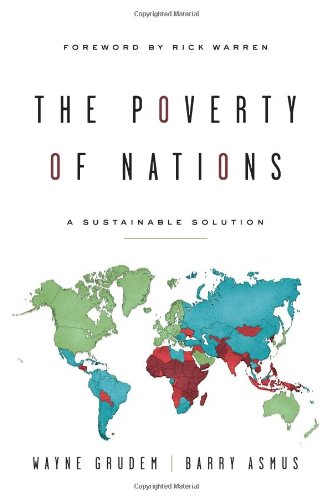
The Poverty of Nations comes with enthusiastic endorsements: Robert Sirico says that “The table of contents alone provides clearer instruction than many graduate students get in economics courses” and Rick Warren asserts that “It should be required reading in every Christian college and seminary, by every relief and mission organisation, and by every local church pastor”. The authors have high ambitions: they state that their goal “Is to provide a sustainable solution to poverty in the poor nations of the world” (page 25) and that their “primary audience” is Christian leaders in poor nations (page 31), and they hope that Christians in more prosperous nations will also read the book. Readers, therefore, start with great expectations. Unfortunately, however, many will end up disappointed. Although the underlying thesis is sound and the book contains sensible analysis, it suffers from serious deficiencies.
Wayne Grudem is a well known theologian and Barry Asmus an equally well known economist. Both are committed Christians and are at pains to stress that financial well-being is not the ultimate goal in life. Indeed, this may be the only economics book that contains a call to trust in Jesus Christ (page 41). Nonetheless, the book’s subject is material well-being. The authors suggest that, once the fundamentals are understood, “it becomes evident that if we want to solve poverty, the correct goal is that a nation continually produces more goods and services per person each year” (page 45). They passionately believe that the best (perhaps, only) mechanism for achieving this is the free market but they also emphasise that “the right kind of economic system does not by itself bring a nation out of poverty” (page 107). They discuss the importance of political and legal systems (especially the rule of law, property rights, the absence of corruption and the provision of adequate education and healthcare), various different kinds of freedom (including freedom of movement and of establishment and freedom from excessive regulation) and core political values (i.e. cultural attitudes and norms).
The authors place the responsibility for pulling a nation out of poverty firmly with the nation’s own leaders. They recognise that wealthy nations have a part to play (e.g. by lowering trade barriers and stopping “commodity dumping”); they accept that limited, targeted use of foreign aid may be appropriate (although they repeat the well rehearsed arguments against its widespread use); and they recognise that some of the blame for Third World poverty rests with more wealthy nations. However, they conclude that “even if external factors or entities have had some negative effect in poor nations, they are still secondary causes of poverty today, not primary causes” (page 83). The poor are not poor because the rich are rich.
The authors recognise that what they are saying is not new. In particular, they owe a huge debt to David Landes, quoting “The Wealth and Poverty of Nations” several dozen times (perhaps, excessively). Nonetheless, it is good to see the core arguments for a free market system clearly re-asserted and the chapter on its moral advantages is particularly welcome. The authors defend the system against all comers and suggest that, even in relation to the evils of selfishness and materialism, it is better than the other options. Conversely, they attack these other options, quoting with approval Claire Berlinski’s summary of Margaret Thatcher’s view that “socialism was not a fine idea that had been misapplied, it was an inherently wicked idea” (page 198).
There are also shorter but nonetheless interesting discussions of the dangers of governments becoming monopoly purchasers and the moral issues associated with “wants” (i.e. desires), which the authors suggest should not be equated with greed but rather regarded as “a good thing, part of God’s original creation” (page 218). This leads to the conclusion that “it is important for people to think of an “ideal” life as one of joyful production that benefits both themselves and others” (page 345).
So what is wrong with the book? First, it tries to deal with too many different issues. It contains no less than 79 different recommendations and the result is that the second half of the book at times feels like a list. Many of the points overlap (which results in repetition) and some are not properly argued or developed. For example, the brief discussion of need for religious freedom fails to show how it connects with economic growth, whilst the discussion relating to the family (including sexuality in general) is shallow.
In principle, the idea of bringing together a theologian and economist is a good one, allowing the economic analysis to be firmly grounded in theological and ethical considerations. However, in practice, the result is that neither the economic nor the theological arguments are properly developed. In particular, some of the biblical analysis is disappointingly superficial and contentious. For example, Grudem argues that the Bible sees the role of government as being essentially limited but fails to explain why it is that the authors favour universal compulsory government provided education (which many Christians until the 20th century would have strongly opposed).
The authors place great weight on the Biblical command to “Be fruitful and multiply and fill the earth and subdue it” (Genesis 1:28, which they quote a dozen times). This is a good starting point for a Christian view of economics but the authors place a weight on it that it cannot bear. In particular, it underlies their comments relating to the need to secure “freedom to utilise energy resources” (page 283) and other comments relating to the environment, some of which are highly contentious yet asserted in strident terms. This is a pity because (as Landes has pointed out), the Judeo-Christian subordination of nature to man has been important to economic development and there is a dangerous element of pagan animism underlying parts of the ecological movement today.
The statement that society needs to believe “that the earth’s resources will never be exhausted” (page 339) is another example of the same issue. There is a respectable case for this belief and it is important to challenge at the doom mongers who for two centuries have been constantly warning of catastrophe caused by excessive resource utilisation. However, the single page that the authors devote to this subject results in their claim appearing as an a priori belief rather than a carefully thought through conclusion.
More generally, despite the acknowledgement that the free market system is not perfect (page 207), the book contains little in the way of balanced critique of it and it is disappointing that, after some very good analysis and foundation laying in the first two-thirds of the book, the final third leaves one with the impression that the authors are inviting poorer countries to adopt the U.S. system wholesale, including things such as the right to bear arms (page 232) and the U.S. concept of patriotism (page 359), which do not appear to have much to do with economic development.
These are serious defects. They are likely to alienate many readers and fail to persuade others who might be open in principle to persuasion, including the Third World leaders who the authors claim are their target audience. Furthermore, those wanting detailed historic economic analysis would be better off with The Wealth and Poverty of Nations. Nonetheless, there is enough that is good within the book to make it worth reading and it might also be useful as a book to be critically discussed in the Christian colleges, seminaries, relief and mission organisations and churches to whom Rick Warren has recommended it.
“The Poverty of Nations: A Sustainable Solution” was published in 2013 by Crossway (ISBN: 978-1-4335-3911-4). 373pp (excluding bibliography).
 Richard Godden is a Lawyer and has been a Partner with Linklaters for over 25 years during which time he has advised on a wide range of transactions and issues in various parts of the world.
Richard Godden is a Lawyer and has been a Partner with Linklaters for over 25 years during which time he has advised on a wide range of transactions and issues in various parts of the world.
Richard’s experience includes his time as Secretary at the UK Takeover Panel and a secondment to Linklaters’ Hong Kong office. He also served as Global Head of Client Sectors, responsible for Linklaters’ industry sector groups, and was a member of the Global Executive Committee.
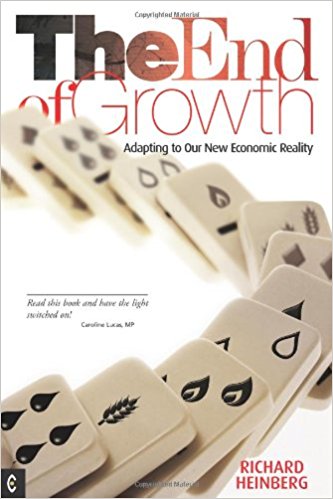
Richard Heinberg is an American journalist and author that has dedicated most of his writing career to environmental causes. His most notable works include publications such as, The Party’s Over: Oil, War, and the Fate of Industrial Societies (2003), and Powerdown: Options and Actions for a Post-Carbon World (2004).
Just from the book titles alone, an astute reader can gain a sense of Richard Heinberg’s environment angle. Indeed, there is a common thread that flows throughout his body of work and which is probably best exemplified in the book we are reviewing here: The End of Growth: Adapting to Our New Economic Reality (2011).
In a nutshell, Heinberg’s thesis is this: Global economic growth as we have become accustomed to over the past century or so is “…over and done with” (page 1). When talking about “growth”, Heinberg is referring here to the overall size and expansion of the economy, i.e. an increase in both consumption and production (ibid.).
So how come? Why will there be no more economic growth? Throughout the book Richard Heinberg builds his argument on three main assumptions. First, the depletion of natural resources (fossil fuels & minerals). Secondly, the negative environmental impact of exploiting resources (e.g. Deepwater Horizon, the BP oil spill disaster). And thirdly, the ‘financial disruptions’ caused by our defective banking and regulatory system and its inability to deal with both “resource scarcity and soaring environmental costs” (page 2). For these three main reasons, historical records of economic growth are no longer sustainable in the future.
Let’s turn slightly to the structure and content of the book. “The End of Growth” is well-written and thoroughly researched. From the onset, it becomes apparent that the author has a wealth of experience and knowledge of the subject. Indeed, Heinberg spent over two decades examining and writing about environmental issues and this clearly shows throughout the book.
The book is structured around seven main chapters. The first two open the discussion with a more generalised debate on historical economics and the influences of both Marxist and capitalist ideology in shaping the current state of global macroeconomics. Heinberg also talks about the financial crisis of 2007/8 and how the actions of the Federal Reserve (like Quantitative Easing) are akin to a “Ponzi Scheme” that could ultimately lead to rising interest costs and even currency failure (page 75).
Chapters three and four turn towards the environment and the limitations of earth’s natural resources. Economists and experts in the field have largely ignored the obvious: natural resources are finite. As they become increasingly scarce, the race and exploitation in finding them will have dire consequences on the environment. The BP Oil Spill is given as a clear example of how petroleum companies need to search in deeper and more dangerous areas to find oil. Heinberg goes through all the major natural resources and explains their limitations, including, Oil, water, food, and metals. In chapter four Heinberg remains sceptical that new technologies and innovations will be sufficient to promote growth and stop climate change. He asserts that, “Civilisations advance human knowledge and technical ability, but they also tend to generate levels of complexity they cannot support beyond a certain point. When that point is reached, civilisations decline or collapse” (page 187).
Chapters five and six move the discussion toward a more international dimension. Heinberg effectively sees China’s recent economic growth as a “bubble” (page 190). A bubble that is overwhelmingly dependent on favourable age demographics and a reliance on coal as a primary energy source. Chapter 6 talks about how ill-equipped our current geopolitical system is to both adapt and succeed in a post-growth, contracting economic climate.
Finally, chapter seven concludes with an explorative study in how society (especially civil society) can adapt and grow in a post-growth world. In short, Heinberg believes that organising and local community initiatives will have a crucial role to play. He speaks about “Transition Towns” and “Common Security Clubs” where “The work of local groups should include the sharing of practical skills such as food production and storage, home insulation, and the development and use of energy conserving technologies.” (page 270).
At the end of the day, Richard Heinberg’s “The End of Growth: Adapting to Our New Economic Reality” remains something of a paradox. On one hand, the core of his message rings true: we are consuming and in some cases, abusing resources that are by definition, finite. On the other hand, it feels like the book is too pessimistic and sceptical – it underestimates the power of new and innovative technologies and overemphasises the negative impact of consumerism. For instance, his analysis on electric cars in Chapter four (page 159) is superficial at best. Heinberg fails to consider the rapid advancement in battery technology and their ability to store power.
Readers in search of a gloomy, sceptical analysis on the future of the environment and economic growth should pick up this book. Those seeking a more balanced account should look elsewhere.
“The End of Growth: Adapting to Our New Economic Reality” was published in 2011 by Clairview Books (ISBN-10: 1905570333). 231pp.

Andrei Rogobete is a Research Fellow with the Centre for Enterprise, Markets & Ethics. For more information about Andrei please click here.

A Voice To Be Heard is not a systematic economic, theological or historical analysis of Christian entrepreneurship, although it contains a number of economic, theological and historical observations. Instead, it comprises ordered reflections on Christian entrepreneurship based around the stories and thoughts of 50 contemporary Christian entrepreneurs interviewed by the authors.
The authors are the well-known Director of Faith in Business at Ridley Hall, Cambridge, Richard Higginson, and the rather less well-known Zambian entrepreneur, Kina Robertshaw. They say that the book is “for actual entrepreneurs, aspiring entrepreneurs and anyone who wants to know more about them” (page xvi) but they are being unduly modest in their expectation: the book provides food for thought for all Christians and, since it is readable, interesting and important, it deserves to widely read.
It begins with pen portraits of five Christians involved in business and uses their stories to clarify what the authors mean by the term “Christian entrepreneur”. They are not referring to “entrepreneurs who happen to be Christian” but rather to “Christians who see their companies as an outworking of their faith” (page 13).
The authors then provide some brief comments on what the Bible has to say about entrepreneurship, attitudes to entrepreneurship in the UK today and the history of Christian entrepreneurship in the UK. This part of the book comprises less than 50 pages, so it is not an in-depth study. However, it is useful in framing the discussion that follows.
The heart of the book comprises an examination of a series of issues that are of particular relevance to entrepreneurs the idea of a calling to business; the question whether business may contribute to the advance of God’s Kingdom; vision and purpose; risk taking; relationships; stewardship; integrity; prayer; and perseverance. Each section combines the stories and views of those who have been interviewed with the reflections of the authors.
Fortunately, the authors have resisted the temptation to provide statistical analysis of the answers to their interview questions or to include the answers of all of their respondents to every question. They have been selective in their quotes and used them to set up a dialogue on particular issues in which they have then inserted their own thoughts. The result is that business issues are brought to life by means of stories and the related theological and ethical issues are clearly laid out.
The authors are clearly reluctant overtly to criticise those they interviewed. However, the methodology used invites the reader to evaluate what is said and the authors gently correct some views and challenge others, perhaps recognising that they should not expect those they have interviewed to be as successful as theologians as they obviously are as business people!
The most interesting part of the book is that which considers the answers that the authors received to the question “Do you see your working business as contributing to the advance of God’s Kingdom?” They tell us that the answer “was a resounding yes” (page 77) but that the answers to the follow-up question – “If so, how?”, varied hugely. Some of the entrepreneurs focussed on their belief that they are contributing to making the world a better place, some on the way in which their companies are run (i.e. the embodying of Christian values), others on the opportunities to witness provided by their businesses and still others on the opportunity to give to charitable and Christian causes. The authors suggest that the Kingdom of God is being advanced in each of these four ways and urge entrepreneurs to have “a broad view of God’s Kingdom rather than a narrow one” and “to embrace all these different categories in a holistic understanding rather than limit themselves to only one” (page 89). This is surely right: we are called on to serve God not in spite of our work or even simply in addition to it but in it and through it (see Colossians 3:23).
The authors issue an equally big challenge to the Church as a whole. This arises from the answers to the question “How do you view the attitude of the church towards you? Negative or positive?” (page 189). A mere 20% of the answers were positive and a further 30% were broadly neutral. The rest of the answers were negative, a result that demonstrates that, despite progress in recent years, Christians who have been called into business are often “made to feel like second-class citizens in God’s Kingdom” (to quote Jeff Van Duzer, in Why Business Matters to God). Many of the entrepreneurs interviewed “often feel appreciated only for the financial support they are potentially able to provide” (page 194) and there is very little evidence of positive support being provided to Christians in business.
Of course, some of the apparent problems may be a matter of perception and it may also be that people in churches naturally offer support to those who appear obviously in need of it (perhaps even emotionally fragile), overlooking entrepreneurs since they are the kind of people who appear self-sufficient. However, the Church needs to do better and the authors suggest that there are six things that the local Church ought to do: to listen; to give entrepreneurs a voice in the Church; to pray; to make biblical teaching more relevant; to be open to the fact that God might seriously be calling people beyond the confines of the Church and to recognise that entrepreneurs may have a significant role to play in Church leadership. These are all points that deserve proper consideration and action.
Overall, the book is broad rather than deep in its analysis: there are many books that examine the relevant history and underlying theology and ethical issues in greater detail and libraries could be filled with weighty tomes examining the economics relevant to entrepreneurship. Furthermore, the book does not have incisive new insights for those who have already looked at the theory in detail. However, these comments are not criticisms: they merely indicate the nature of the book. It focusses on the practicalities and real-life issues faced by Christian entrepreneurs and it does not merely look at the easy bits: bankruptcy and difficult issues relating to integrity are addressed in an honest manner. Of course, there are things that many would take issue with (e.g. the suggestion that God resembles an entrepreneur in having “a willingness to take risks”, page 28) and some parts of the book are weaker than than others (e.g. the chapter on prayer is of a very general nature and has little that is specific to entrepreneurs). However, these points are minor quibbles: the book is well worth reading.
“A Voice To Be Heard Christian Entrepreneurs Living Out Their Faith” was published in 2017 by Inter-Varsity Press (ISBN: 10: 1783595655); 208 pp.
 Richard Godden is a Lawyer and has been a Partner with Linklaters for over 25 years during which time he has advised on a wide range of transactions and issues in various parts of the world.
Richard Godden is a Lawyer and has been a Partner with Linklaters for over 25 years during which time he has advised on a wide range of transactions and issues in various parts of the world.
Richard’s experience includes his time as Secretary at the UK Takeover Panel and a secondment to Linklaters’ Hong Kong office. He also served as Global Head of Client Sectors, responsible for Linklaters’ industry sector groups, and was a member of the Global Executive Committee.
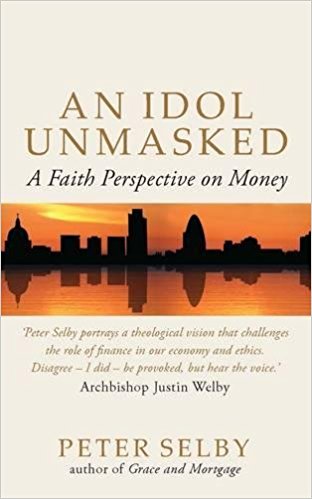
Peter Selby’s polemic against modern money, An Idol Unmasked, was published a few years ago now, in 2014, but captures an attitude to money and modern finance that remains widely prevalent. It is, as he says, a book ‘about money, what it has become, and what it represents in our lives’ (page 3). His key claim, expressed repeatedly throughout the book, is that money has acquired the characteristics of an idol. It now rules peoples’ lives in a way it never quite did before. ‘The quite widely held view,’ he says, ‘that money is not in itself harmful, only the love of it or greed for it, is turning out to be out of date’ (page 3). Over two of the main chapters, Selby links this claim to the decreasing sovereignty of nation states over money, and the increasing role of global financial institutions in the creation and movement of money. More than that: ‘money has long since passed from the control of the public authorities and has become itself the major controlling force behind the organisation of society’ (page 30). Having identified the idol of money and its power over us, he then turns in the final chapters of the book to some theological reflection.
One immediately obvious flaw with Peter Selby’s claim to have unmasked the idol of money (expressed, for example, in the title of the book) is the inconvenient truth that associating money with idolatry is hardly a new idea. Identifying money as an idol or potential idol has deep roots in Judeo-Christian thought. It’s there in the Hebrew Prophets, in Jesus’ teaching about ‘Mammon’, in the apostolic teaching about greed (‘which is idolatry’, Col 3:5), and plays in important role in Christian ethical discourse thereafter. Selby clearly knows this, and even makes reference to some of this material, but seems strangely slow to acknowledge or engage with what others have said.
To be saying something new, Selby needs to demonstrate that money has changed somehow – that it has become ‘more of’ and idol, with a more powerful role over peoples’ lives than it has ever had before. But the argument here is unclear. One problem is that he never quite defines what he means by ‘money’, and seems to use the word in a number of different ways — sometimes referring to currency, sometimes wealth, sometimes ‘a set of ideas’ or even a ‘controlling force’. Another problem is the absence of any evidence or data beyond the anecdotal to back up the claims being made. These are basic issues of method. There also seems to be an insufficient grasp of some of the issues. For example, Selby argues that the globalization of money creation – removing some of the sovereign power once possessed by individual nation states over their currencies – has given money a destructive, anarchic life of its own, ‘acting only on its uncontrolled instinct to produce more of itself’ (page 53). It doesn’t seem to occur to him that the decentralization of money creation might have some good features – taking away too much power from any one player in the system, for example. No doubt there’s much more to say on this, and these are complex issues. The problem is: the issues and counter-arguments are hardly raised at all. Selby generates considerable heat as he develops his polemic – but not much confidence in his depth of understanding.
What then of the theological reflection towards the end of the book? This begins well enough with some reflections on the nature of idolatry. But we then get some very strained readings of Jesus’ parables as anti-market polemics (pages 98–110) – a classic case, if ever there was one, of someone reading into a text precisely what they want to hear. Weaker still is the proposed solution to the problems Peter Selby finds in modern money – what he calls ‘the mercy economy’ (pages 111–126). Given everything he’s said earlier in the book, this rather surprisingly doesn’t seem to involve getting rid of money altogether. It is in fact quite hard to work out quite what it is or might involve, beyond perhaps some debt forgiveness and maybe, perhaps, some kind of universal basic income (page 124). Whatever the ‘mercy economy’ is in detail, Selby seems to be suggesting that the solutions to the problems of money-idolatry lie in structural change or intervening to reform ‘the system’. For a theological reflection, there is precious little on the battle in the human heart behind our tendency to idolatry – and what can be done about that – which is where a deeper reflection on the Scriptures might have taken him.
Reviews of bad restaurants can be fun to read and I suspect they are quite fun to write (which then compensates, somewhat, for the critic’s experience of the meal itself). Every failed dish or example of poor service is described and unpicked with a darkly humorous glee and relish. One could probably do the same with the claims and arguments of An Idol Unmasked, picking over them one by one. But the practical purpose of a bad restaurant review is to advise readers to find a meal elsewhere. Likewise with this book. Anyone in search of a balanced and insightful analysis of contemporary monetary systems and markets, coupled with some deep theological reflection, is not going to find it here.
“An Idol Unmasked: A Faith Perspective on Money” was published in 2014 by Darton, Longman and Todd Ltd (ISBN 978-0-232-53111-4), 140pp.
 Revd Dr Ben Cooper is Minister for Training at Christ Church Fulwood in Sheffield. He holds doctoral degrees in both Theology and Economics. Before training for ordained ministry, he was a post-doctoral research fellow in economic theory at Nuffield College, Oxford. He is married to Catherine and has three children.
Revd Dr Ben Cooper is Minister for Training at Christ Church Fulwood in Sheffield. He holds doctoral degrees in both Theology and Economics. Before training for ordained ministry, he was a post-doctoral research fellow in economic theory at Nuffield College, Oxford. He is married to Catherine and has three children.
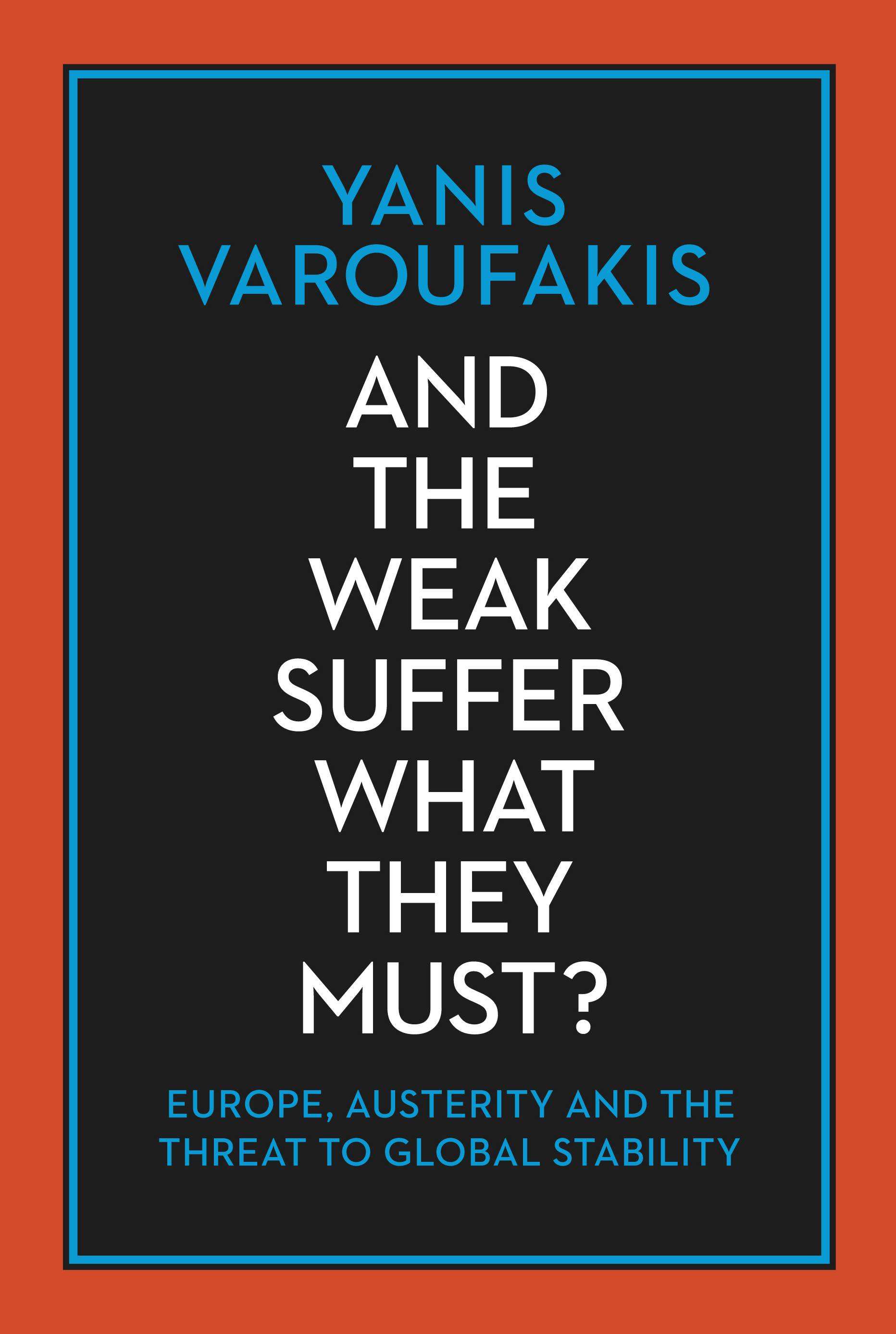
In this book, Yanis Varoufakis (Professor of Economics at the University of Athens) gives a highly informative and very well-informed account of the austerity measures enforced by the institutions of the European Union (EU) since the financial crisis which began in 2007-2008. He also sets these events and policies in the wider context and history of the EU, and especially of the economic relationship between the EU and the USA. As the title shows, Professor Varoufakis is deeply concerned about the impact of these policy measures on the people who are weakest in a society: most plainly, the weak in Greece (his own country), but also in other EU countries. This is a concern which Christians must of course share, given the many biblical injunctions to uphold the cause of the poor and needy.
Varoufakis’ account is especially well-informed because of his (short-lived) role as Greece’s Finance Minister between January and July 2015: he was directly involved in many lengthy meetings between the Greek government and the major EU bodies. These negotiations were focused on the debt crisis which hit the Eurozone in 2010 (a direct consequence of the 2007-8 crisis in London and Wall Street), and in which the desperate finances of the Greek banks were a central part. Prof Varoufakis was already well underway with writing this book when he chose to stand for election in Greece – motivated by precisely the concerns and arguments about which he was already writing.
More than half of the book is taken up with an account of the economic relationship between the USA and the EU and its predecessors: the European Coal and Steel Community, which evolved into the European Economic Community [Common Market]. The key aspects here centre on macroeconomic policy and the nature of global capitalism: and these are, as Varoufakis shows, central to the contemporary challenges for policymakers, for capitalism and indeed for democracy.
This material (chapters 1 to 5) often takes a fair amount of wading through (although it is thoroughly researched). But the case he presents is a strong one. In his own words (pp137-8): ‘The reason Europe seemed to be prospering in the late 1990s and until 2008, despite having introduced an unsustainable gold standard [i.e. permanent monetary union in the form of the Euro], had little if anything to do with the design of its single currency and everything to do with the fact that there was no need for political surplus recycling [emphasis added], as the world of private finance was doing plenty of fair-weather recycling’. What Varoufakis means here by ‘recycling’ is nothing to do households with putting plastics and paper into bins of various colours (!). Instead he is talking about macroeconomic and monetary flows between and within countries. In essence, during the 1950s and 1960s, the ‘Bretton Woods’ economic institutions helped to ensure that no developed economy slumped into permanent recession or depression; and, even after the collapse of those arrangements in 1971, the large and growing ‘twin deficits’ of the USA (i.e. both a Balance of Payments current account deficit, with imports exceeding exports, and a public sector deficit, with government expenditure exceeding tax receipts) helped to enable economic growth to continue in the EU and the Eurozone. There was no need for the countervailing current account surplus in countries such as Germany to be recycled by the hand of politicians, since the macroeconomic ‘weather’ continued to be fair – until 2008. However, the 2007-8 crisis brought all of this crashing down; and the poor design of the Euro, Varoufakis argues, meant that the Eurozone countries had no defence against the ensuing crisis.
Varoufakis also makes a strong argument for what is many ways is a very depressing proposition. The argument is that – in the light of the above history – the EU’s political, economic and monetary institutions do not have it in their DNA to provide a suitably flexible response to a crisis such as that of 2007-8 and its aftermath. In essence the EU’s structures centralize power (e.g. in the hands of ‘bureaucrats’) and are incapable of being made democratically accountable.
On that basis, in the remaining chapters Varoufakis proceeds to explain the interconnections between the post-2008 debts of private (commercial) banks, the perceived need to bail out these banks, and the EU’s requirement that governments must introduce austerity measures as the price for the EU agreeing to complex packages to try to resolve the severe difficulties. Crucially, argues Varoufakis, the ‘no bailouts of EU countries’ rule was at the heart of why the follies of bankers led to the price being paid by the weakest citizens (in the form of austerity measures), most especially in Greece. ‘A clueless political elite, in denial of the nature and history of a crisis whose roots go back to at least 1971, is pursuing policies akin to carpet-bombing the economies of proud European nations in order to save them’ (p192).
Varoufakis makes no secret of his left-wing convictions, and his atheism is also evident. He writes with passion and intelligence about some very serious challenges facing European and global capitalism, and the book is well worth reading.
Let me conclude with some questions that are raised by this book, especially from a Christian perspective. First, are we sufficiently concerned for how macroeconomic and political forces impact on the weakest in our societies? The title of the book, as Varoufakis explains on p19, is drawn from Thucydides’ Peloponnesian War: at one point the powerful Athenian generals explained to the helpless Melians that ‘the strong actually do what they can and the weak suffer what they must’ [translation by Varoufakis]. Substitute ‘politicians and bankers’ in place of ‘the strong’, and it is hard not to find this very chilling.
Secondly, what is the future for the EU? This is evidently a question not only for the UK (whatever one’s views about Brexit). Varoufakis is an internationalist, and sees nationalism as a great problem; yet he is deeply pessimistic about the EU.
Thirdly, how can global capitalism be better managed, so that the power of money and finance (we might even say ‘Mammon’) is circumscribed and a more truly democratic political economy is shaped?
“And the Weak Suffer What They Must? Europe, Austerity and the Threat to Global Stability” was published in 2016 by Nation Books (ISBN – 10: 1568585047), 368pp.
 Revd Dr Andy Hartropp is an economist, theologian and church minister. He has two PhDs, one in Economics and one in Christian Ethics. He lectured in financial economics for 5 years at Brunel University, west London. He also worked for a year with the Jubilee Centre in Cambridge, primarily leading a team doing research on families in debt. He trained at Oak Hill College, London, for ordained ministry in the Church of England. His (second) PhD was published as: What is Economic Justice? Biblical and secular perspectives contrasted (Carlisle: Paternoster, 2007). He has spent 13 years in parish ministry. He worked for eight years with the Oxford Centre for Mission Studies, where he was the Sundo Kim Research Tutor in Mission and Economics. In March 2016 he joined Waverley Abbey College as Director of Higher Education. He chairs the Ethics and Social Theology Group of the Tyndale Fellowship. He is married to Claire, and they live in Bicester, near Oxford.
Revd Dr Andy Hartropp is an economist, theologian and church minister. He has two PhDs, one in Economics and one in Christian Ethics. He lectured in financial economics for 5 years at Brunel University, west London. He also worked for a year with the Jubilee Centre in Cambridge, primarily leading a team doing research on families in debt. He trained at Oak Hill College, London, for ordained ministry in the Church of England. His (second) PhD was published as: What is Economic Justice? Biblical and secular perspectives contrasted (Carlisle: Paternoster, 2007). He has spent 13 years in parish ministry. He worked for eight years with the Oxford Centre for Mission Studies, where he was the Sundo Kim Research Tutor in Mission and Economics. In March 2016 he joined Waverley Abbey College as Director of Higher Education. He chairs the Ethics and Social Theology Group of the Tyndale Fellowship. He is married to Claire, and they live in Bicester, near Oxford.

This book’s subtitle is deceptive; it is not a volume about business ethics so much as a fascinating piece of social history. Ten great Victorian entrepreneurs are described in turn, with very little attempt to add any interpretation. The names of the ten speak for themselves: Thomas Holloway, Titus Salt, Samuel Morley, George Palmer, Jeremiah James Colman, Andrew Carnegie, George Cadbury, Joseph Rowntree, Jesse Boot, and William Hesketh Lever. Each chapter takes an essentially chronological view, with many delightful details set alongside a sweeping narrative of business-building, all within the context of the major social and economic changes that the Victorian era brought.
I was struck by how deeply these ten particular accounts of enterprise intersected with my own life history. For example, Thomas Holloway founded Holloway College in Egham, Surrey, which is very near where I grew up; the Colman factory site in Norwich, Nofolk, included nearby some purpose-built housing, one of which made a fine (albeit small) home for me and my wife when we were first married; and the Joseph Rowntree Charitable Trust (JRCT) is now a member of the Church Investors Group (CIG), which I chair, and one of the CIG Trustees is a JRCT nominee. More generally, many of the household products made or retailed by these companies are still to be found on our larder shelves. This is the kind of history that really does overlap with our lives in an ordinary, down-to-earth way.
While Bradley himself does not offer much interpretation or synthesis, I found plenty of themes that emerged. First, each story included accounts of what I call ‘attentiveness’: the ability to spot an opportunity and to be persistent in following it up. The entrepreneur is not someone who will carefully construct a five-year strategic plan for the future. Rather, she or he will be alive to opportunities. For example, we read of Titus Salt: ‘One day in 1834, while on a buying visit to Liverpool docks, he noticed a pile of 300 or so dirty-looking bales lying in a corner of a warehouse. They turned out to be fleeces of the alpaca…’ (p.28). As the account unfolds we discover how an attentive entrepreneur made the most of an opportunity that started a new industry. The technological advances needed came from someone else (the inventor), while the entrepreneur had eyes on changes in society, on ways in which resources could be mobilized, and how people’s imaginations could be caught and aspirations met.
Secondly, the connection to a certain kind of Christianity is very striking. Quakerism and Congregationalism, with their focus on temperate living, self-help, lack of privilege and simple hard work had a tremendously formative influence on all these ten men. Although they were restless in seeking out profitable business opportunities and in being competitive, they were never personally greedy for riches. Their lifestyles were in many ways frugal, and they all showed extraordinary generosity as benefactors.
Thirdly, all of them were to a greater or lesser extent paternalistic. In nearly all of the businesses described there is a ‘family’ feel, whether through care of employees who fell ill or through the well-known model villages such as Saltaire, Bournville, Earswick and Port Sunlight. One of the significant things about this is the way it anchors a business in a locality, and gives depth to its history. Although Bradley does not discuss this aspect, it seems to me that this ‘rootedness’ of enterprises is one of the hallmarks of the Victorian era. These were companies that had a good sense of where they belonged, both in time and in place, something that is generally much weaker now, when production facilities are relocated because of marginal cost advantages. It is simply inconceivable that George Cadbury would have moved his Bournville factory to Eastern Europe or the Far East to reduce costs.
Fourthly, each of these ten men was involved to some extent in public life. They wanted to make a difference to society, often in local or national politics. They saw business as an integrated part of how society works, rather than an ‘external’ source of tax revenue or some kind of threat to government or the people.
I enjoyed this book, but would have valued some kind of attempt to interpret these themes. Even more interesting would have been a discussion about how entrepreneurs today might help society rediscover its roots in time and place, but without the paternalistic baggage that belongs to a different era. Although it is tempting to describe the Victorian period as a golden age for enterprise, the truth is that businesses such as Facebook and Google have stories that are just as fascinating. However, such analysis doubtless belongs in a different book.
The writing style is clear and easy to read. Most of the book was written in 1987, with additional material added in 2007. It is therefore occasionally out of date, for example when describing the Cadbury business of today.
“Enlightened Entrepreneurs: business ethics in Victorian Britain” was published in 2007 (Revised Ed.) by Lion Books (ISBN-10: 0745952712).
Edward Carter is Vicar of St Peter Mancroft Church in Norwich, having previously been the Canon Theologian at Chelmsford Cathedral, a parish priest in Oxfordshire, a Minor Canon at St George’s Windsor and a curate in Norwich. Prior to ordination he worked for small companies and ran his own business.
He chairs the Church Investors Group, an ecumenical body that represents over £10bn of church money, and which engages with a wide range of publicly listed companies on ethical issues. His research interests include the theology of enterprise and of competition, and his hobbies include board-games, volleyball and film-making. He is married to Sarah and they have two adult sons.